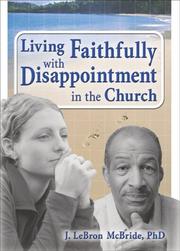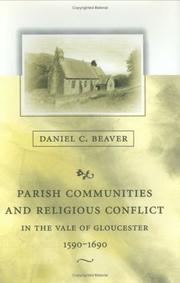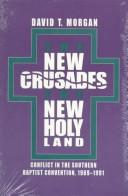| Listing 1 - 10 of 23 | << page >> |
Sort by
|
Book
ISBN: 1433575809 9781433575785 1433575787 9781433575792 1433575795 9781433575808 9781433575778 Year: 2021 Publisher: Wheaton : Crossway,
Abstract | Keywords | Export | Availability | Bookmark
 Loading...
Loading...Choose an application
- Reference Manager
- EndNote
- RefWorks (Direct export to RefWorks)
In this practical guide, pastors Mark Dever and Paul Alexander have compiled a practical handbook for pastors and church leaders on how to build a healthy church grounded in the gospel.
Book
ISBN: 156699649X 9781566996495 9781566994040 1566994047 Year: 2011 Publisher: Herndon, Virginia : Alban Institute,
Abstract | Keywords | Export | Availability | Bookmark
 Loading...
Loading...Choose an application
- Reference Manager
- EndNote
- RefWorks (Direct export to RefWorks)
Pastors are called to be not only leaders with vision, but also managers of congregational systems, says John Wimberly in The Business of the Church. Drawing on his thirty-six years in ordained ministry, Wimberly weaves the realities of congregational dynamics and faith-centered purpose together with practical, proven approaches to business management. A student and friend of Rabbi Edwin Friedman, Wimberly builds on Friedman's systems theory as he helps readers avoid common pitfalls and put into practice effective techniques of congregational management. The book begins with a foundational dis
Church management. --- Church administration --- Parish administration --- Parish management --- Management --- Theology, Practical --- Church closures

ISBN: 0789026228 1315044153 1135427984 9781135427986 129986743X 9781299867437 9781315044156 078902621X 9780789026217 9780789026224 9781135428051 9781135428129 1135428050 Year: 2005 Publisher: New York : Routledge,
Abstract | Keywords | Export | Availability | Bookmark
 Loading...
Loading...Choose an application
- Reference Manager
- EndNote
- RefWorks (Direct export to RefWorks)
A practical approach to address spiritually crippling disappointment with the church!
Feeling disappointment with your church can be spiritually devastating. Living Faithfully with Disappointment in the Church gives you a theological and family therapy approach to disillusionment in the church that is practical and realistic. The author, an ordained minister and a licensed family therapist, discusses with sensitivity and hope the problems and the ways to resolve issues of spiritual disappointment.
Living Faithfully with Disappointment in the Church uses a theological bas
Church controversies. --- Church conflicts --- Church disputes --- Church fights --- Conflicts, Church --- Controversies, Church --- Fights, Church --- Church management --- Religious disputations
Book
ISBN: 9004412921 9004399887 9789004412927 9789004399884 Year: 2020 Publisher: Brill
Abstract | Keywords | Export | Availability | Bookmark
 Loading...
Loading...Choose an application
- Reference Manager
- EndNote
- RefWorks (Direct export to RefWorks)
"The growth of the megachurch (generally defined as a regular attendance of over 2,000 people) is undoubtedly one of the most exceptional religious trends of recent times, certainly within the Christian sphere. Spreading from the USA, megachurches have now become common globally - reaching different national and cultural contexts. The edited volume Handbook of Megachurches offers a comprehensive account of the subject from various academic perspectives: sociology, religious studies, religious history and religious studies among them. Topics covered include: the historical developments and growth, typologies, theology, popular culture, revivalism, social engagement, and the manifestation of megachurches in such countries as Canada, Russia, India and Africa. Contributors are: Richard Burgess, Mark Cartledge, Saliha Chattoo, Simon Coleman, Katie Corcoran, Andrew Davies, David Eagle, Stephen Hunt, Jonathan James, Torsten Löfstedt, Gordon Melton, Martyn Percy, Charity Rakestraw, Peter Schuurman, Kate Stockly, Azoneh Ukah, Marc von der Ruhr, James Wellman, Michael Wilkinson. Foreworded by David Bromley".
Big churches. --- Churches, Big --- Churches, Large --- Congregations, Big --- Congregations, Large --- Large churches --- Megachurches --- Church growth --- Church management --- Church work --- Religion --- General
Book
ISBN: 1498280986 9781498280983 9781498280990 1498280994 9781498280976 1498280978 Year: 2016 Publisher: Eugene, Oregon : Cascade Books,
Abstract | Keywords | Export | Availability | Bookmark
 Loading...
Loading...Choose an application
- Reference Manager
- EndNote
- RefWorks (Direct export to RefWorks)
Conflict over homosexuality in Christian churches is only intensifying. We can do better. We have to do better. The stakes are too high to do otherwise. Conflicts are difficult and ugly, but the good news reaches even here. It is possible to have healthy conflict, to disagree and struggle together in ways that make us better and that make the church stronger. By looking deeply into the nature of religious conflict, we can cultivate practices and values that will mature our abilities as peacemakers, and strengthen our faith and our churches.
Homosexuality --- Church controversies. --- Sex --- Identity (Psychology) --- Sex (Theology) --- Church conflicts --- Church disputes --- Church fights --- Conflicts, Church --- Controversies, Church --- Fights, Church --- Church management --- Religious disputations --- Religious aspects --- Christianity.

ISBN: 0674020626 9780674020627 0674758455 9780674758452 Year: 1998 Volume: 129 Publisher: Cambridge, MA : Harvard University Press,
Abstract | Keywords | Export | Availability | Bookmark
 Loading...
Loading...Choose an application
- Reference Manager
- EndNote
- RefWorks (Direct export to RefWorks)
Many historians have attempted to understand the violent religious conflicts of the seventeenth century from viewpoints dominated by concepts of class, gender, and demography. But few studies have explored the cultural process whereby religious symbolism created social cohesion and political allegiance. This book examines religious conflict in the parish communities of early modern England using an interdisciplinary approach that includes all these perspectives. Daniel Beaver studies the urban parish of Tewkesbury and six rural parishes in its hinterland over a period of one hundred years, drawing on local ecclesiastical court records, sermons, parish records, corporate minutes and charity books, and probate documents. He discusses the centrality of religious symbols and ceremonies in the ordering of local societies, particularly in local conceptions of place, personal identity, and the life cycle. Four phases in the transformation of parish communities emerge and are examined in this book. This exploration of the interrelationship of religion, politics, and society, and the transformation of local communities in civil war, has a value beyond the particular history of early modern England, contributing to a broader understanding of religious revivals, fundamentalisms, and the persistent link between religion, nationalism, and ethnic identity in the modern world.Table of Contents: Introduction: Church History as a Cultural System Part I: Social Form, 1590-1690 Reverend Histories: Geography and Landscape Parts, Persons, and Participants in the Commonwealth: Social Relations, Institutions, and Authority Under the Hand of God: Parish Communities and Rites of Mortality Part II: Social Process, 1590-1690 Circumcisions of the Heart: Church Courts, Social Relations, and Religious Conflict, 1591-1620 A Circle of Order: The Politics of Religious Symbolism, 1631-1640 To Unchurch a Church: Civil War and Revolution, 1642-1660 Astraea Redux: Religious Conflict, Restoration, and the Parish, 1660-1689 Bloody Stratagems and Busy Heads: Persecution, Avoidance, and the Structure of Religion, 1666-1689 Conclusion. Symbol and Boundary: Relgious Belief, Ceremony, and Social Order Appendix 1. Tables Appendix 2. Accusations of Witchcraft in Tewkesbury Notes Manuscript Sources IndexReviews of this book: "In an intriguing argument, Beaver suggests that the reception of the Reformation into the Vale of Gloucester, where it lacked broad support, enabled dissenting religious groups to reject the territorial parish, in favour of the 'imagined communities' of the like-minded.His work is an important one. It translates the conflict of the seventeenth century into a local study that has a wider theoretical application.Beaver has written a perceptive and incisive study of religious and communal conflict in Stuart England, and one that is central to our understanding of seventeenth century society." --William Gibson, Albion [UK] "A significant historical study.This is not simply a work of local history, as it throws considerable light on wider aspects of the great conflict that convulsed Stuart England.The discussions are confident, sensible, and well grounded in the evidence.No other book that I know of covers the experience of a region (as distinct from a town) throughout the entire troubled history of seventeenth-century England in anything like this depth.It is original in the systematic way it applies anthropological concepts to English political and religious conflicts." --David E. Underdown, Yale University "He turns a local study into something that has theoretical force, as well as taking issue with other historians of Tudor-Stuart England on matters like the impact of the Civil War, 'revolution,' 'Restoration,' Laudianism and the like." --David D. Hall, Harvard Divinity School "Parish Communities and Religious Conflict in the Vale of Gloucester examines the belief and activities of ordinary men and women in the Vale of Gloucestershire during the last years of Elizabeth's reign and throughout most of the seventeenth century. It goes beyond most regional studies, however, in emphasizing the effect of religious change and conflict on local communities. Class and gender as well as religious convictions are seen as important factors determining social cohesion and political allegiance.this is a valuable study that should interest historians as well as students of religion in England." --History Reviews of this book: Daniel Beaver has written a volume grounded in extensive manuscript sources and combining the methodologies of social and cultural history with the theories of cultural anthropology. His geographical focus is the single-parish town of Tewkesbury and its environs (an area of approximately twelve square miles) in the county of Gloucester. Chronologically and thematically, however, his range is much broader, encompassing a wide range of topics relating to parish communities and religious conflict in the tumultuous seventeenth century.Beaver's reliance on rich local manuscript sources, complemented by his anthropological approach, provides useful insights into the particular local manifestations of dramatic shifts in the policies of the nation state during that time of unprecedented religious and political change.--Caroline Litzenberger, Journal of Ecclesiastical History
Church controversies. --- Church conflicts --- Church disputes --- Church fights --- Conflicts, Church --- Controversies, Church --- Fights, Church --- Church management --- Religious disputations --- Tewkesbury Region (England) --- Church history --- Church controversies --- Tewkesbury Region (England) - Church history - 16th century --- Tewkesbury Region (England) - Church history - 17th century
Book
ISBN: 9780754668299 9780754668350 9780754697282 0754697282 0754668290 0754668355 1282344633 9781282344631 9786612344633 Year: 2009 Publisher: Farnham, Surrey, England ; Burlington, VT : Ashgate Pub. Ltd.,
Abstract | Keywords | Export | Availability | Bookmark
 Loading...
Loading...Choose an application
- Reference Manager
- EndNote
- RefWorks (Direct export to RefWorks)
This book examines the theological foundations of a collaborative approach to Christian ministry. The discovery that Christians are members 'one of another' creates energy and joy in ministry and empowers the Church in an age of mission. Outlining the present challenges for ministry, Stephen Pickard offers an historical perspective on ministry over the last century; develops a theory of collaborative ministry based on a dialogue between theology and science; and explores some implications of collaborative ministry for lay and ordained people of the Church. This book breaks new ground in its theory of collaborative ministry through a dialogue with the sciences of emergence. It also offers fresh insights on important texts in ministry; relationships between Christology, Pneumatology and ministry; a relational ontology of ministry; episcopacy, ecumenism, ordination vows; and wisdom for team ministry.
Cooperative ministry. --- Group ministry. --- Church management. --- Pastoral theology. --- Christian leadership. --- 253 --- Church leadership --- Lay leadership --- Church work --- Leadership --- Care of souls --- Cure of souls --- Ministry --- Pastoral office and work --- Theology, Pastoral --- Pastoral care --- Church administration --- Parish administration --- Parish management --- Management --- Theology, Practical --- Church closures --- Co-ministry --- Ministry, Group --- Multiple staff ministry --- Team ministry --- Cooperative ministry --- Ministry, Cooperative --- Church management --- Pastoral theology --- Zielzorg. Pastoraat --- Christian leadership --- Group ministry

ISBN: 9060091116 Year: 1973 Publisher: Meppel : Boom,
Abstract | Keywords | Export | Availability | Bookmark
 Loading...
Loading...Choose an application
- Reference Manager
- EndNote
- RefWorks (Direct export to RefWorks)
Social psychology --- Religious studies --- Church controversies --- Pastoral psychology --- Polarization (Social sciences) --- #gsdbS --- #gsdb6 --- #GROL:SEMI-159.922.5 --- #GGSB: Godsdienstpsychologie --- Political science --- Social groups --- Social influence --- Clerical psychology --- Pastoral psychiatry --- Psychology, Clerical --- Psychology, Pastoral --- Pastoral theology --- Psychology, Religious --- Church conflicts --- Church disputes --- Church fights --- Conflicts, Church --- Controversies, Church --- Fights, Church --- Church management --- Religious disputations --- Church controversies. --- Pastoral psychology. --- Polarization (Social sciences). --- Godsdienstpsychologie

ISBN: 0585184119 9780585184111 0817308040 9780817308049 Year: 1996 Publisher: Tuscaloosa : University of Alabama Press,
Abstract | Keywords | Export | Availability | Bookmark
 Loading...
Loading...Choose an application
- Reference Manager
- EndNote
- RefWorks (Direct export to RefWorks)
The author details the conflict between some modern-day Southern Baptists, who saw themselves as crusaders for truth, as they sought to redeem a new holy land--the Southern Baptist Convention (SBC)--from the control of other Southern Baptists they viewed as "liberals." To the so-called liberals, the crusaders were "fundamentalists" on a mission, not to reclaim the SBC in the name of theological truth, but to gain control and redirect its activities according to their narrow political, social, and theological perspectives. Book briefly discusses the founding of the Cooperative Baptist Fellowship (CBF).
Baptists --- Church controversies --- Fundamentalism --- Christianity --- Religion --- Philosophy & Religion --- Baptist Church --- Anabaptists --- Christian fundamentalism --- Protestant fundamentalism --- Religious fundamentalism (Protestantism) --- Protestantism --- Theology, Doctrinal --- Evangelicalism --- Millennialism --- Modernist-fundamentalist controversy --- Church conflicts --- Church disputes --- Church fights --- Conflicts, Church --- Controversies, Church --- Fights, Church --- Church management --- Religious disputations --- History --- Doctrines. --- History. --- Doctrines --- Southern Baptist Convention --- SBC --- United States --- Church history
Book
ISBN: 1621901335 9781621901334 9781621901129 1621901122 Year: 2014 Publisher: Knoxville, [Tennessee] : University of Tennessee Press,
Abstract | Keywords | Export | Availability | Bookmark
 Loading...
Loading...Choose an application
- Reference Manager
- EndNote
- RefWorks (Direct export to RefWorks)
Conservatism --- Church controversies --- Baptists --- Conservativism --- Neo-conservatism --- New Right --- Right (Political science) --- Political science --- Sociology --- Church conflicts --- Church disputes --- Church fights --- Conflicts, Church --- Controversies, Church --- Fights, Church --- Church management --- Religious disputations --- Baptist Church --- Anabaptists --- Religious aspects --- Southern Baptist Convention --- History --- SBC
| Listing 1 - 10 of 23 | << page >> |
Sort by
|

 Search
Search Feedback
Feedback About UniCat
About UniCat  Help
Help News
News